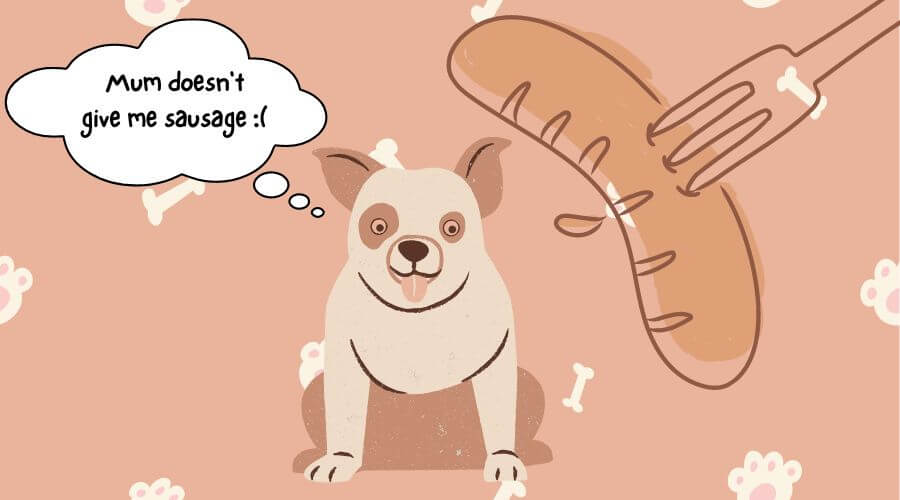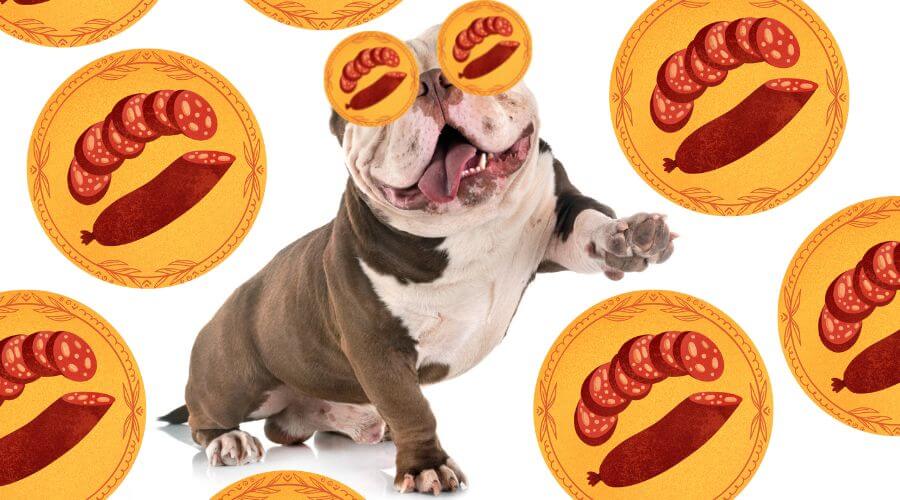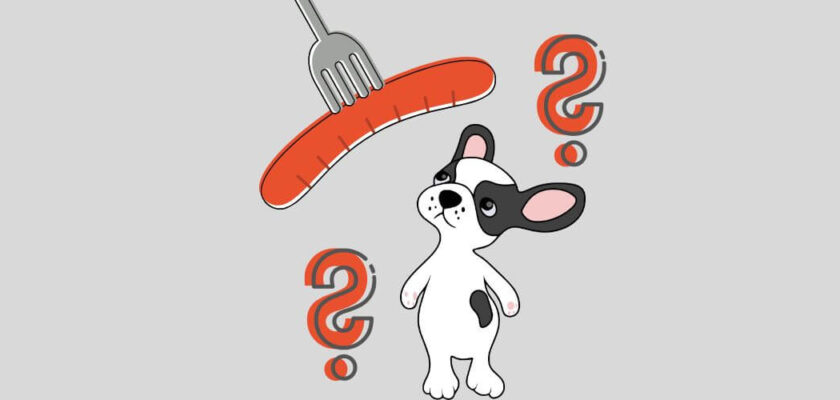Key Takeaways
- Sausage is processed pork, beef, or turkey. The biggest risk for dogs is the high salt and fat content.
- Sausage does have some benefits for dogs. It is a good source of protein, zinc, and vitamin B6, all of which are important elements for dogs. Additionally, sausage contains choline – an essential nutrient for dogs.
- The risks associated with feeding your dog too much sausage include pancreatitis (an acute condition of the pancreas), obesity, cancer, diabetes, heart disease, and an upset stomach on a daily basis.
- Can dogs eat sausage? Generally, it is not recommended.❌
- If you are thinking about feeding your dog sausage, start by adding a small amount to your dog’s diet.
- Always check the list of ingredients – the best kind of sausage includes turkey or chicken (lower in fat and salt) without any added preservatives, spices (especially onion and garlic, as they are toxic to dogs!) and artificial ingredients.
What Is Sausage Made Of? What Are the Benefits for Dogs?
Not only is sausage packed full of protein and essential minerals like zinc, vitamin B6, and choline – which helps liver health while preventing cognitive decline in older doggos – but it’s also surprisingly tasty. Though caution should still be taken because it’s high in fat and salt, in moderation, it may just give Fido that extra boost they need for day-to-day life. Can dogs eat sausage without limits? No! We’ll talk about the risks next.
Editor’s Note
The sizzling sausage with some seasoning on a Sunday morning plate? Is that what you are thinking right now? A piece of sausage might be fine for both humans and dogs, but perhaps the risks outweigh the benefits? In this article, we will explore both sides of the argument and let you decide for yourself what is best for your dog. So, can dogs eat sausage?
The Risks Associated With Feeding Your Dog Too Much Sausage
Dog owners should think twice before serving up a plate of pork sausages at breakfast time. While these meaty treats are iconic, they’re bad for dogs. Because they’re loaded with fat, they can potentially lead to obesity or worse – pancreatitis, cancer or heart disease. Owners would be wise instead to stick with dog food, lower in salt and fat than Vienna sausages, sausage links, bacon, pepperoni or ham.

How to Introduce Your Dog to Sausages
If you want to give your pup a special treat, consider adding sausage in moderation. Start with just a small portion and gradually increase it over the next few weeks so that your canine companion can adjust without any health risks. However, it’s essential not to feed too much sausage to dogs that already have a healthy diet. Too much protein is not good for dogs. Also, stick to the cooked version and stay away from fried sausage snacks.
The Best Kind of Sausage for Your Dog
Can dogs eat sausage of all kinds? Possibly, but the healthiest option lies with turkey or chicken sausages. These contain less fat and salt compared to beef and pork varieties. Not only this, but they also offer an excellent source of protein while avoiding any added preservatives or artificial ingredients which can potentially cause harm if consumed too frequently – so remember moderation is always key!

Other Foods You Can Give Your Dog Instead of Sausages
Try feeding your dog these nutrient-dense snacks instead of sausages!
- Peanut butter – packing protein, healthy fats, and vitamins B and E. What’s more, its antioxidants will protect your dog’s cells from damage.
- Yogurt – made with probiotics (beneficial bacteria) that promote a healthy digestive system, and also provides calcium, potassium, and magnesium.
- Green beans – all the fiber your dog needs with few calories! Moreover, they’re rich in vitamin A, vitamin C, folate, potassium, and iron.
- Broccoli – an abundant source of calcium, vitamin C, protein, and fiber.
- Eggs – easily digestible protein and other essential nutrients with limited calories.
- Salmon – high in omega-3 fatty acids, which work wonders for our furry pals!
Can Dogs Eat Sausage? What’s the Final Saying?
Rewarding your dog with sausage for obedience may be effective, but feeding them too much can have negative effects on their health. Don’t fret, though – with so many alternatives, your pup won’t miss out even if they’re not having any yummy pork treats. Sausage isn’t everything. Make sure it’s just one (small) part of a balanced diet for your pooch!
If you want a healthy dog, you require reassurance: can dogs eat sausage? As mentioned above, we recommend small amounts! It’s always better to be on the safe side!
Frequently Asked Questions
What Happens If a Dog Eats a Sausage?
Some types of sausage may contain onions, garlic, or other seasonings that are toxic to dogs. Indulging in even small amounts could result in serious bellyaches or worse. Watch closely for signs of distress like vomiting and diarrhea if your pup decides they can’t resist the delicious morsel!
What Happens If a Dog Eats Pork Sausage?
Pork sausage can cause digestive upset in dogs, especially if it contains unhealthy seasonings or additives. Eating raw pork sausage may also be a risk for the transmission of food-borne illnesses to pets.
Why Can’t Dogs Have Sausage?
Sausage is processed meat that often contains unhealthy ingredients like garlic, onion, and other seasonings. Eating large amounts of sausage or sausage with unhealthy seasonings can cause digestive upset in dogs and may even lead to more serious health issues. Additionally, raw pork sausage can carry harmful bacteria that can be transmitted from food to pets.
What Meat Should Dogs Not Eat?
Dogs should not eat any processed or cooked meats that contain unhealthy seasonings or additives, such as sausage. Additionally, they should avoid eating raw meat as this can carry harmful bacteria and parasites. Dogs should only be fed lean cuts of fresh meat that have been cooked without seasoning.
Similar Posts:
- Can Dogs Eat Turkey? Is It Good for Dogs?
- Can Cats Eat Pork? Or Is It Bad for Cats?
- Can Dogs Eat Pork? Are Pork Bones Bad for Dogs?
- Can Dogs Eat Spam?
- Can Dogs Eat Salami?
- Can Dogs Eat Raw Meat? Pros and Cons of Feeding Your Dog Raw Food
- Can Dogs Eat Bacon? Eating Pork: Safe or Bad for Dogs?
- Can Cats Eat Bacon? Is Raw Bacon Safe For Cats To Eat?

